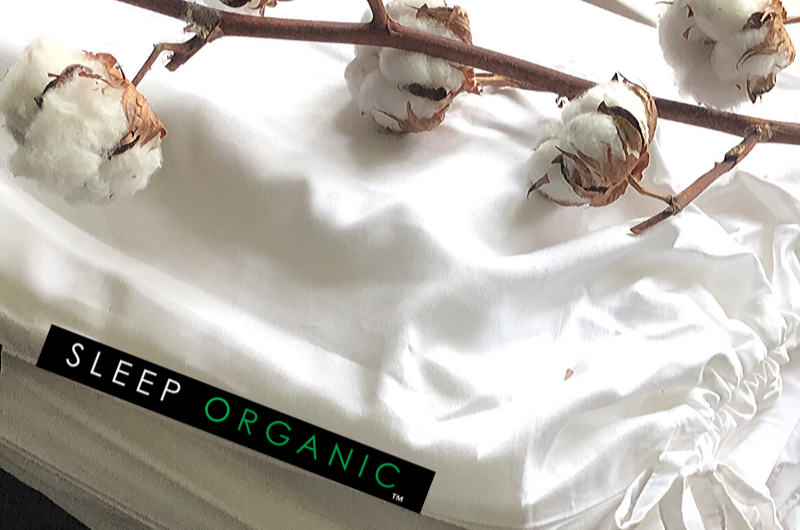
2021 is here, and it's time to make sure you start the year in the way you mean to continue. Switching out old sheets and duvet covers for new organic cotton bedding could be a great way to cement your commitment to sustainability, and feel like a whole new you. But why should you choose organic bedding? Just why are organic cotton sheets such a good idea?
Let's take a look at some of the reasons why you should choose to make the switch to organic cotton bedding this year:
Organic Cotton Reduces Emissions and Helps Tackle Our Climate Crisis
CO2 emissions per hectare of organic agriculture systems are 48 to 66 percent lower than in conventional systems. What is more, carbon farming practices on organic cotton farms can significantly increase the capacity of farm land to catch and sequester carbon.
That means that by choosing organic bedding you are helping to tackle our climate crisis. And makes this a far better choice than synthetic fabrics, made from fossil fuels and created with high carbon costs. And also a superior choice to non-organic cotton, which is also associated with much higher carbon emissions.
Organic Cotton Bedding Helps You Sleep Easy – Knowing You're Saving Our Soils
You might think you are doing the right thing by choosing natural rather than synthetic fabrics. But even fibres that are grown can come at a cost. Non-organic, intensive production of cotton and other natural fibres damages the precious soil ecosystem upon which we all depend.
Between one billion and six billion hectares of agricultural land on our planet is already classed as degraded or seriously degraded. Organic cotton farms which implement no till and soil cover practices significantly reduce soil erosion and topsoil loss, and protect our soils.
Organic Cotton Production Conserves Fresh Water
Another key factor to think about in making sustainable decisions is water. Non-organic farming uses vast quantities of water each year. Agriculture accounts for, on average, 70 percent of all water withdrawals globally, and an even higher share of “consumptive water use” due to the evapotranspiration requirements of crops.
The global average water footprint for just 1kg of cotton is 10,000 litres – as much as you might drink in almost 14 years! In the United States, where sustainable improvements in cotton growing have made a difference, irrigated farms use less than in places like India, where inefficient water use and high rates of water pollution mean a high water footprint. However, standard cotton production still wastes vast amounts of water each year.
The water pollution impact of organic cotton has been shown to be 98% less than standard cotton production.[1]
Choosing Organic Bedding Helps Protect Wildlife and Halt Biodiversity Losses
In conventional cotton production, cotton is grown in large fields in conditions which require the use of a number of pesticides and herbicides – chemicals used to control pests and weeds. The way in which cotton is usually grown makes it necessary to use these harmful chemicals in order to achieve a good harvest.
Regular cotton uses more of these than any other farmed plants. Cotton accounts for 16% of global insecticide releases – more than any other single crop.[2] Unfortunately, the pesticides commonly used in cotton production are very dangerous for wildlife. Non-organic production threatens wildlife and is implicated in worrying biodiversity losses.
Organic Cotton Protects People and Keeps You and Your Family Safe
The chemicals used in non-organic cotton production are bad news for people too. The World Health Organisation (WHO) estimates that over 350,000 people die every year from acute pesticide poisoning. This figure does not include deaths from cancer or other chronic diseases caused by pesticide exposure. In addition, the WHO estimates that long-term exposure may result in upwards of 750,000 people suffering from specific chronic defects and cancers each year. This number refers to developing countries alone.
Even around the developed world, there is a growing concern over pesticide residues – not just in food and drink but on clothes and bedding too. Choosing organic bedding means that you will not need to worry about these residues, and can keep you and your family safe.
Our organic cotton bedding is GOTS (Global Organic Textile Standard) certified and carries the Soil Association Organic label. Since it is also Fairtrade, you can also rest assured that workers throughout the supply chain have been treated fairly.
In 2021, we all need to do the right thing for people and planet, and choosing organic bedding is just one more step you can take in the right direction.
Nisa Shah, co-founder Sleep Organic
[1] https://www.soilassociation.org/take-action/organic-living/fashion-textiles/organic-cotton/
[2] EJF, 'The Deadly Chemicals in Cotton', Environmental Justice Foundation, London, UK
